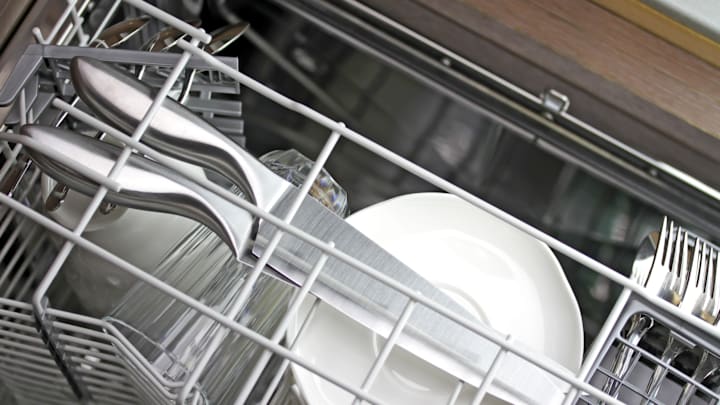Dishwashers are one of the great innovations of the 20th century, freeing families from tackling their caked-on pans and lasagna plates by hand. And while certain items are plainly labeled as dishwasher-safe or not, there’s one utensil that you’ve probably been loading in error this whole time: Your knives.
The reason has to do with preserving the function of the knife. A dishwasher usually cleans at a high temperature. That, combined with moisture, is likely going to damage a stainless-steel blade by dulling it or allowing it to begin to rust. Combine that environment with the high-pressure water spray of modern dishwashers and you’ve got a recipe for a ruined blade.
If your knife has a wooden handle, you’re compounding the issue by subjecting the wood to moisture. (Reminder: wood and water don’t go well together.)
Beyond water damage, knives can also come loose from the utensil tray, dulling their edges by knocking into plates or other silverware. If the knife isn’t damaged, then it might harm something else, including the dishwasher shelves.
The best way to clean a knife—which probably isn’t getting too dirty to begin with—is to wash it by hand with tap water and dish soap. Avoid soaking the blade, as it can damage the knife and possibly your hand if you go reaching for it under some murky dish water. When you’re done washing, try to wipe it clean as soon as you can. Leaving it to air-dry introduces prolonged contact with water, which is bad for the reasons already explained.
The knife prohibition typically only applies to chef’s knives for chopping and cutting. A butter or table knife doesn’t have a sharp edge to preserve, so you’re probably safe there.
While you’ll want to leave your knife out of the rinse cycle, there are a surprising number of things you can safely stick in your dishwasher, including silicone oven mitts, refrigerator shelves, baby toys, and even golf balls.
[h/t Kitchn]
